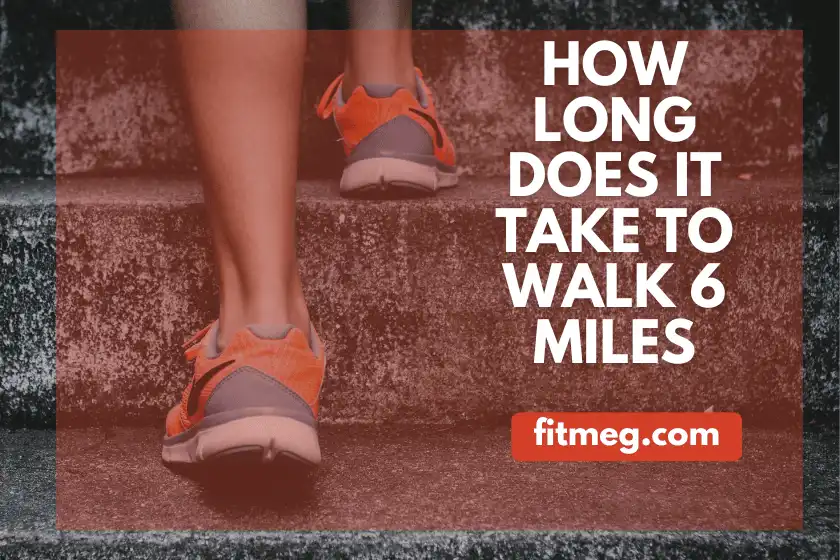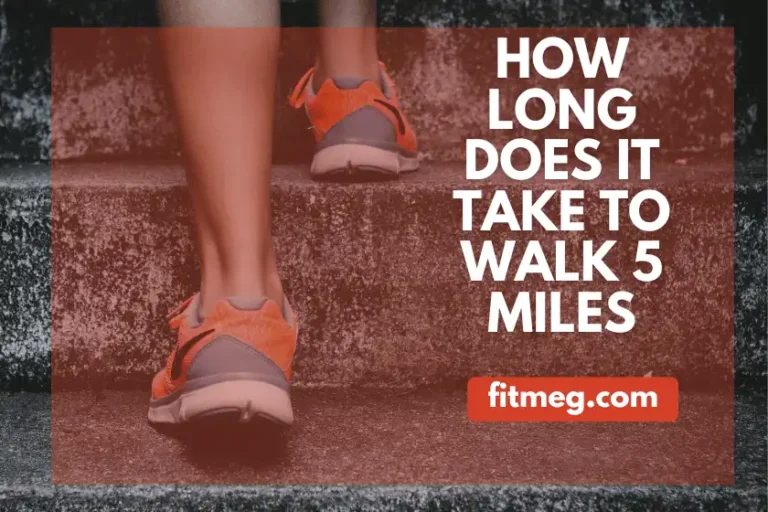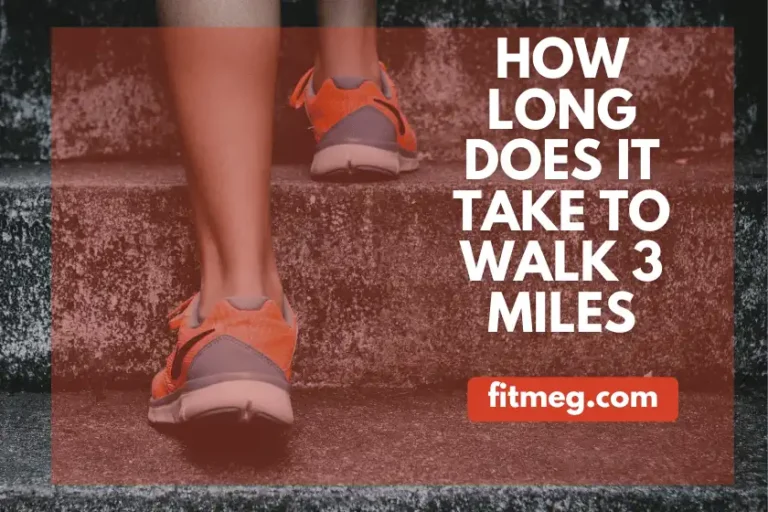How Long Does It Take To Walk 6 Miles By Age and Pace?

Introduction
Walking is one of the most accessible and beneficial forms of exercise. Setting a goal to walk 6 miles can provide an excellent challenge to improve your fitness, burn calories, and boost your health. But how long does it take to walk 6 miles? And how many calories can you expect to burn along the way?
The time and calorie burn will vary substantially based on your age, gender, pace, terrain, fitness level and other factors. This comprehensive guide examines the average time to walk 6 miles across these different categories. You’ll also gain insight into the many variables that impact both your speed and calorie burning when walking. Personal stories provide real-world experiences to illustrate the data. Finally, helpful preparation and recovery tips will ensure you get the most out of your 6 mile walk.
Key Takeaways
- The time it takes to walk 6 miles depends greatly on your pace, with a brisk 10-minute mile pace finishing in about 50 minutes and a moderate 20-minute mile pace taking around 2 hours. Other key factors like age, gender, terrain, and fitness level also affect the time, with younger fit adults generally completing 6 miles fastest.
- Pace has a major impact on time and calories burned when walking 6 miles. A faster pace of 10 min/mile burns the most calories (880) in the least time (50 mins).
- Younger adults tend to complete 6 miles fastest. The average time for ages 20-40 is 1.5-2 hours. Older adults 75+ take 3-4 hours.
- Men generally walk 6 miles slightly faster than women, averaging 1.5-2 hours vs 2-2.5 hours for women.
- Fitness level significantly influences pace and calorie burn over 6 miles. Improving cardiovascular fitness can quicken pace over time.
- Proper preparation and training make walking 6 miles at a brisk pace an achievable goal for most healthy adults. Following tips can optimize performance and recovery.
Average Time and Calories Burned Walking 6 Miles
Let’s start by looking at some averages. The table below outlines the approximate time it takes to walk 6 miles based on pace, along with total calories burned. These baseline numbers will vary by age, gender, and other factors explored later in the article.
| Pace (min/mile) | Time to Walk 6 Miles | Calories Burned |
|---|---|---|
| 20 min/mile | 2 hours | 410 |
| 15 min/mile | 1 hour 30 mins | 550 |
| 12 min/mile | 1 hour | 720 |
| 10 min/mile | 50 minutes | 880 |
At a moderate 20 minute per mile walking pace, it takes most people about 2 hours to cover 6 miles while burning around 410 calories. Picking up the pace to 15 minutes per mile reduces the time to 1.5 hours and increases calorie burn to 550 calories. A brisk 12 minute mile pace cuts the time to 1 hour and calories to 720. Finally, walking at a 10 minute per mile clip allows you to finish the 6 miles in only 50 minutes and torch 880 calories.
These numbers illustrate the impact of pace on both time and calorie expenditure. But age and gender also influence walking speed and calorie burn over 6 miles.
Also Read:- How Long Does It Take To Walk 5 Miles By Age And Pace?
Breakdown by Age
A study from 2011 shows walking speed tends to decrease significantly with increasing age . Here is an overview of average expected walking times for 6 miles across different age groups:
| Age Group | Average Time to Walk 6 Miles |
|---|---|
| 20-40 | 1.5 to 2 hours |
| 40-60 | 2 to 2.5 hours |
| 60-75 | 2.5 to 3.5 hours |
| 75+ | 3 to 4 hours |
Younger adults in their 20s and 30s can generally cover 6 miles in 1.5 to 2 hours. Middle age adults between 40 and 60 often take closer to 2 to 2.5 hours. For adults aged 60-75, the average time is 2.5 to 3.5 hours. Seniors over age 75 typically require 3 to 4 hours to walk the 6 mile distance.
The younger age groups burn more calories on the 6 mile walk due to their faster paces. For example, at age 20 burning 550 calories walking 6 miles would be common, while at age 70 the calories may drop closer to 450.
Breakdown by Gender
When comparing genders, men tend to walk faster than women on average, which also impacts calorie expenditure. Here are the typical finishing times for walking 6 miles by gender:
| Gender | Average Time to Walk 6 Miles | Calories Burned (Approx.) |
|---|---|---|
| Men | 1.5 to 2 hours | 510 |
| Women | 2 to 2.5 hours | 440 |
Due to stride length and other biomechanical factors, men generally walk 6 miles about 30 minutes faster than women. This equates to roughly 70 more calories burned during the 6 mile walk. A 160 pound man would burn around 510 calories, while a 140-pound woman would burn 440 calories.
Of course, fitness level plays a big role as well. A very fit woman may easily outpace an inactive man. But in general population averages, men tend to be faster walkers.
Factors that Impact Walking Time and Calorie Burn
Now that you know average times, let’s explore why walking speed and calorie burn varies so much person to person. There are many factors that influence the time it takes someone to walk 6 miles along with the total calories used up along the way.
Walking Speed
Walking speed or pace has the biggest influence on time and calories burned on a 6 mile walk. Pace can range substantially based on fitness and other factors. For example, compare a beginner walker at 30 minutes per mile to an experienced walker at 12 minutes per mile. It would take the beginner 3 hours to finish 6 miles while burning around 340 calories. The experienced walker could cover the distance in just 1 hour burning over 700 calories. Pace matters!
Age and Gender
As discussed earlier, age and gender impact average walking speed and endurance. You tend to naturally slow down as you get older. And males generally have faster paces than females when comparing population averages. But individuals can absolutely boost their pace through training. An active, healthy 75 year old may walk 6 miles faster than an inactive 25 year old. Don’t let age define your pace.
Terrain
Walking uphill significantly increases difficulty, slowing pace substantially. A steep hill can reduce speed by 2-3 minutes per mile compared to flat terrain. Downhill grades allow faster speeds. Trail terrain with rocks and roots also usually slows pace. Ideal flat sidewalks or paved trails enable the fastest consistent pace and should be sought out when aiming for a 6 mile time goal. The variety of terrain walked makes a big impact on speed and calorie burn.
Fitness Level
Those new to walking will move slower initially compared to experienced walkers. But as cardiovascular fitness improves, so will pace and endurance. A Couch to 6 Mile training program can help beginners gradually build up pace and distance. Cross training like swimming and cycling boost overall fitness that transfers to quicker walking. Fitness gains achieved in training will help improve pace and calorie burn on 6 mile walks.
Weather Conditions
Environmental factors like heat, humidity, wind and rain make walking more difficult and slower. Cold weather limits speed but allows easier breathing. Optimal conditions for fast walking are 50-70°F with low humidity and low wind. Check the weather forecast and dress appropriately. Adjust expectations on pace and plan for more breaks on extremely hot, cold or inclement weather days.
Also Read:- How Long Does It Take To Walk 3 Miles By Age And Pace?
Practical Advice for Walking 6 Miles
Now that you know what impacts pace and calorie burn over a 6 mile walk, let’s explore some practical tips to prepare for and recover from the distance. Proper planning, pacing, fueling and hydrating will help you achieve your goals safely and comfortably.
Preparation
- Choose a safe route suitable for your pace and fitness level. Mixing flat and hilly terrain adds varied training stimulus.
- Invest in proper walking shoes designed for exercise with adequate support. Replace shoes every 300-500 miles of use.
- Wear moisture wicking clothing that allows sweat to evaporate and keeps you comfortable in different temperatures.
- Bring adequate water and snacks to re-fuel during the walk if needed. Most people need about 5-10 oz of water every 20 minutes.
- Do dynamic warm-up exercises like leg swings, shin grabs and lunges to prep muscles and joints and reduce injury risk.
During the Walk
- Start at an easy, conversational pace. Monitor your breathing so you can speak comfortably.
- Establish a steady, consistent pace suited for the 6 mile distance. Use proper walking form by swinging arms and rolling feet from heel to toe.
- Take occasional short 1-2 minute breaks as needed to rehydrate and recover. Listen to your body.
- Stay properly fueled by consuming calories from snacks and drinking water or sports drinks.
- Adjust your pace slower during hill climbs. Walk efficiently up inclines by shortening your stride instead of over-striding.
- Be mindful of terrain and adjust pace to avoid injury. Slow down if fatigue sets in.
- For motivation, listen to music, walk with a partner, or make it a fun out-and-back route.
Post-Walk Recovery
- Cool down with 5–10 minutes of walking at an easy pace along with some dynamic stretches.
- Properly refuel within 30–60 minutes of finishing your walk to replenish energy stores and help muscles recover. Consume carbs and protein.
- Hydrate well immediately and in the hours after your walk to replace fluids and electrolytes lost through sweat.
- Use foam rolling, massage, ice baths, compression socks, and other recovery techniques to ease any post-walk muscle soreness.
- Understand your calorie burn based on your weight, pace, and distance to meet fitness goals.
- Record your time, pace, and calorie burn. Identify areas to improve and celebrate your accomplishments!
Conclusion
Walking 6 miles is an attainable goal with many health and fitness benefits. While the average time is 1.5-2.5 hours for most walkers, many variables from age and gender to pace and terrain affect how long it takes to cover the distance. Your calorie burn over 6 miles is also influenced by these same factors.
Understanding the potential impacts provides insights into how you can improve your time and calorie expenditure. Setting goals, training strategically, fueling properly, and recovering effectively will help you progress on your 6 mile walking journey. Record your results, learn from each experience, and celebrate your accomplishments.
We’d love to hear from readers about your experiences walking 6 miles. Please share your story and any tips that have helped you improve your pace and calorie burn over this distance. Let’s motivate each other to get moving on the journey to better health!
Frequently Asked Questions (FAQs)
Q) Will I lose weight walking 6 miles a day?
A) Walking 6 miles a day can lead to weight loss if done consistently along with a healthy diet. The calorie expenditure from a brisk 6 mile walk typically ranges from 400-880 calories, promoting a calorie deficit for weight loss over time.
Q) Can you walk at 6 miles per hour?
A) For most walkers, a pace of 6 miles per hour is challenging to sustain. It equals a 10 minute mile pace. However, very fit walkers can manage this brisk pace for 6 miles or more with training. A 4-5 mph pace (12-15 minute mile) is more feasible for recreational walkers.
Q) How many calories does a 6 mile walk burn?
A) Calories burned walking 6 miles range from 400-880 depending on your weight, pace, terrain and other factors. Faster paces and those involving hills or uneven terrain burn the most calories. A 160lb person walking at a moderate 15 minute mile pace burns about 550 calories in 6 miles.
Q) How long does it take to walk 6 miles on a treadmill?
A) On a treadmill with no variation in incline, most walkers complete 6 miles in 1.5-2.5 hours depending on fitness level and walking pace. At 3.5mph (17 min/mile) it takes about 2 hours. At 4mph (15 min/mile) it takes around 1.5 hours.
Q) Is walking 6 miles good exercise?
A) Yes, walking 6 miles is an excellent form of exercise for most healthy adults. It provides a moderate intensity cardio workout that burns calories while lowering risk for heart disease, diabetes and other conditions. Building up to 6 miles is a great fitness goal.
Q) Can you walk 6 miles in 2 hours?
A) Walking 6 miles in 2 hours equates to a 15 minute per mile pace, which is achievable for most moderately active adults. It provides a brisk calorie-burning workout. More fit individuals can complete 6 miles in under 2 hours.
Q) Is it good to walk 6 km a day?
A) Yes, walking 6 km per day (or 3.7 miles) is considered good exercise. Make sure to use proper walking posture and technique. Build up distance gradually if new to regular walking. Always warm up and cool down before and after.
Q) Will walking 6 miles a day tone my legs?
A) Daily 6 mile walks alone may not lead to significant muscle toning. However, the cardio exercise will strengthen leg muscles. Adding exercises like lunges or hills can further tone calves, quadriceps and hamstrings. Resistance training also helps build leg muscle.
Q) How much water should I drink if I walk 6 miles a day?
A) When walking 6 miles daily, drink at least 6-8 oz of water every 20 minutes during your walk. Hydrate well afterwards too, aiming for around 2 liters of total fluids including electrolytes to replace sweating losses and prevent dehydration.






